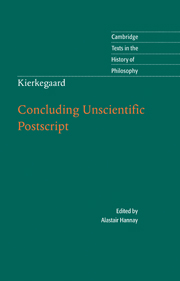Book contents
- Frontmatter
- Contents
- Introduction
- Chronology
- Further reading
- Note on the translation
- CONCLUDING UNSCIENTIFIC POSTSCRIPT TO THE PHILOSOPHICAL CRUMBS
- Preface
- Contents
- Introduction
- Part One The objective problem of Christianity's truth
- Part Two The subjective problem. The subject's relation to the truth of Christianity, or what it is to become a Christian
- 1 An expression of gratitude to Lessing
- 2 Possible and actual theses of Lessing
- 1 Becoming subjective
- 2 The subjective truth, inwardness; truth is subjectivity
- 3 Actual, ethical subjectivity; the subjective thinker
- 4 The problem of the Crumbs: how can an eternal happiness be built on historical knowledge?
- 5 Conclusion
- Appendix: Understanding with the reader
- A first and last declaration by S. Kierkegaard
- Index
- Cambridge Texts in the History of Philosophy
2 - Possible and actual theses of Lessing
Published online by Cambridge University Press: 26 February 2010
- Frontmatter
- Contents
- Introduction
- Chronology
- Further reading
- Note on the translation
- CONCLUDING UNSCIENTIFIC POSTSCRIPT TO THE PHILOSOPHICAL CRUMBS
- Preface
- Contents
- Introduction
- Part One The objective problem of Christianity's truth
- Part Two The subjective problem. The subject's relation to the truth of Christianity, or what it is to become a Christian
- 1 An expression of gratitude to Lessing
- 2 Possible and actual theses of Lessing
- 1 Becoming subjective
- 2 The subjective truth, inwardness; truth is subjectivity
- 3 Actual, ethical subjectivity; the subjective thinker
- 4 The problem of the Crumbs: how can an eternal happiness be built on historical knowledge?
- 5 Conclusion
- Appendix: Understanding with the reader
- A first and last declaration by S. Kierkegaard
- Index
- Cambridge Texts in the History of Philosophy
Summary
So without daring to appeal to Lessing, without positively citing him as my source, without obliging anyone on account of Lessing's fame to feel bound to want to understand, or to protest that they do understand, what only brings them into a suspect association with my own obscurity, doubtless as off-putting as Lessing's fame is attractive, I am now about to present what I'll be damned if I won't attribute to him anyway, even if uncertain that he agrees; what I might, by throwing caution to the winds, easily be tempted to foist on him teasingly as something he had actually said, even if not directly; what in another mood I could wish in starry-eyed admiration to dare thank him for; what again with proud restraint and self-respect I ascribe to him simply out of generosity; and what, once more, I fear will offend or inconvenience him through my bringing his name into connection with these things.
Yes, one seldom finds an author who is such pleasant company as Lessing. And why is that? It is, I think, because he is so sure of himself. All this trivial and easy association between the eminent and the less eminent: that the one is genius, master, the other apprentice, messenger, hired servant, etc. is obviated here. If I strove with a devil's might and main to become Lessing's disciple, I could not, for he has prevented it.
- Type
- Chapter
- Information
- Kierkegaard: Concluding Unscientific Postscript , pp. 61 - 106Publisher: Cambridge University PressPrint publication year: 2009

